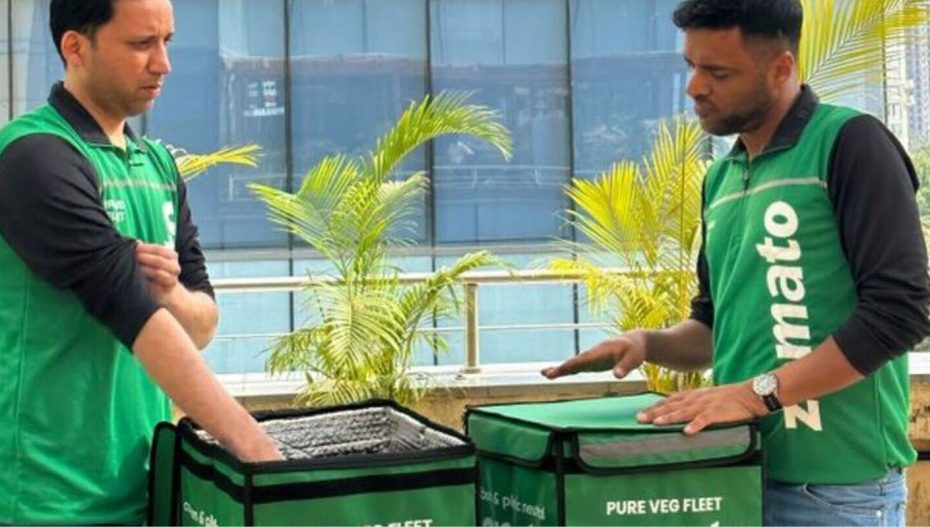This “update” came after many people on social media pointed out how this colour segregation could be used to target those eating non-vegetarian food.
Food delivery company Zomato has come under criticism for its decision to introduce a “pure veg fleet” of delivery vehicles, which will not deliver food from any restaurants that serve egg, fish, chicken or any sort of meat. Originally, company CEO Deepinder Goyal announced that this fleet would wear green and have green delivery boxes on their motorcycle so that they could be told apart, but later said in an “update” that the company decided not to have this segregation and all delivery executives would continue to wear red.
This “update” came after many people on social media pointed out how this colour segregation could be used to target those eating non-vegetarian food.
“This [all delivery executives wearing red] will ensure that our red uniform delivery partners are not incorrectly associated with non-veg food, and blocked by any RWAs or societies during any special days… our rider’s physical safety is of paramount importance to us. We now realise that even some of our customers could get into trouble with their landlords, and that would not be a nice if that happened because of us,” Goyal said on X.
Goyal claimed that a separate fleet was needed because the “smell” of non-vegetarian food may bother people. “…why did we need to separate the fleets? Because despite everyone’s best efforts, sometimes the food spills into the delivery boxes. In those cases, the smell of the previous order travels to the next order, and may lead to the next order smelling of the previous order. For this reason, we had to separate the fleet for veg orders,” he said.
Goyal, however, did not respond to the most stringent criticism of this move – that segregation of this kind, in a county like India, can be communal and casteist by its very nature. “One of the most important aspects of caste is food pollution,” A.F. Mathew, a professor at IIM Kozhikode, told The Hindu.
“It will have to extend to whoever will deliver,” he continued. “What if there is a Muslim driver bringing in a customer’s vegetarian food? … Where is this going? Will Jains deliver for Jains, and Brahmins for Brahmins?”
In a 2018 article in The Wire, scholars Balmurli Natrajan and Suraj Jacob pointed out that “The extent of overall vegetarianism is much less than common claims and stereotypes suggest; survey estimates show that between 23% and 37% of the population of India is vegetarian. Thus, far from being a vegetarian nation, India is a meat-eating majority nation. The notion of ‘non-vegetarian’ and the discourse around vegetarianism, then, reflect the hegemony enjoyed (thus far) by the ‘minority’ vegetarian population.” Even most of the majority Hindu community, the authors stated based on government data, eat non-vegetarian food.
Several leaders from opposition parties and trade unions also criticised Zomato’s announcement. “The last time someone on Zomato requested for a delivery partner of a particular religion, Goyal said ‘food has no religion’. Today, he seems to have gone back on this. I ask him directly, is he now going to categorise delivery partners on the lines of caste, community and religion?” Sheikh Salauddin, president of the Indian Federation of App-Based Transport Workers union, said.
Also read: OpenAI CEO Sam Altman Contemplates Company’s Name











